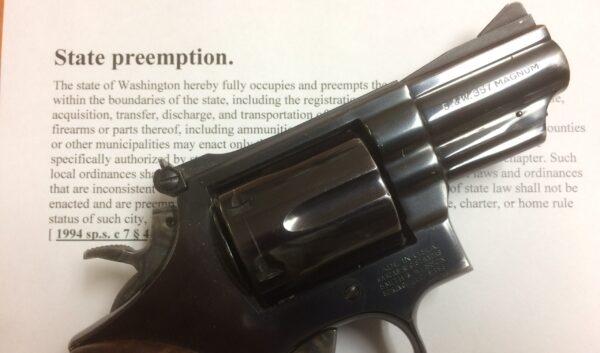
By Dave Workman
Editor-in-Chief
Fifteen Washington State representatives, all Democrats, are sponsoring legislation to repeal the Evergreen State’s nearly-40-year-old model preemption law, which has provided uniformity in firearms regulation by placing sole authority for that task in the hands of the state legislature.
House Bill 1178 opens with a lament that states, “For over 30 years, local towns, cities, and counties have been blocked from taking action on their own to prevent gun violence because of the statewide preemption of local regulations relating to firearms. The legislature intends to provide local jurisdictions the ability to build upon statewide standards and adopt responsible approaches to firearm regulations to help address the epidemic of firearm violence in their communities by restoring inherent local authority to adopt firearm regulations that are in addition to or more restrictive than the requirements of state law under the police power to protect public health, safety, and welfare.”
In recent years, Seattle and Edmonds have been prevented from adopting their own gun regulations, thanks to lawsuits filed by the Second Amendment Foundation (SAF), Citizens Committee for the Right to Keep and Bear Arms (CCRKBA), and the National Rifle Association (NRA), while the state Attorney General’s office took no action.
In 2011, the case known as Chan v. City of Seattle prevented the city from adopting a ban on firearms in city park facilities. SAF, NRA, CCRKBA and other gun rights groups and individual citizens filed that lawsuit.
In 2022, a case known as Bass v. City of Edmonds resulted in a unanimous ruling by the state Supreme Court upholding the preemption law and striking down an Edmonds ordinance requiring so-called “safe storage” of firearms in the city. This ruling essentially nullified a similar ordinance adopted by the City of Seattle, which was facing a similar lawsuit. Both legal actions were filed by SAF and NRA.
Here is Washington’s current law:
The state of Washington hereby fully occupies and preempts the entire field of firearms regulation within the boundaries of the state, including the registration, licensing, possession, purchase, sale, acquisition, transfer, discharge, and transportation of firearms, or any other element relating to firearms or parts thereof, including ammunition and reloader components. Cities, towns, and counties or other municipalities may enact only those laws and ordinances relating to firearms that are specifically authorized by state law, as in RCW 9.41.300, and are consistent with this chapter. Such local ordinances shall have the same penalty as provided for by state law. Local laws and ordinances that are inconsistent with, more restrictive than, or exceed the requirements of state law shall not be enacted and are preempted and repealed, regardless of the nature of the code, charter, or home rule status of such city, town, county, or municipality.
“More than 40 states have preemption laws,” noted CCRKBA Chairman Alan Gottlieb, “and for Democrats in Washington State to be trying to get rid of ours shows just how extreme they are in their gun control policies.”
Washington was one of the first states to adopt preemption, which dates back to 1983 and 1985. It provides uniformity in firearms regulations from border to border. Many other states adopted their own laws based on Washington’s statute.
HB 1178 is sponsored by Representatives Jessica Bateman, Steve Bergquist, Liz Berry, Lisa Callan, Beth Doglio, Davina Duerr, David Hackney, Mari Leavitt, Nicole Macri, Timm Ormsby, Gerry Pollet, Alex Ramel, Julia Reed, Sharon Tomiko Santos, and Amy Walen.
Some city governments want to set up their own gun control laws, which was the case prior to 1983. At that time, the state was something of a checkerboard of different regulations, and supporters of the existing preemption law are wondering why Democrats want to roll back the calendar to a time when local regulations might be confusing if not in conflict.
Many in the firearms community will be asking their state representatives why they would be willing to surrender their authority to city governments when the law has worked well for almost four decades.



